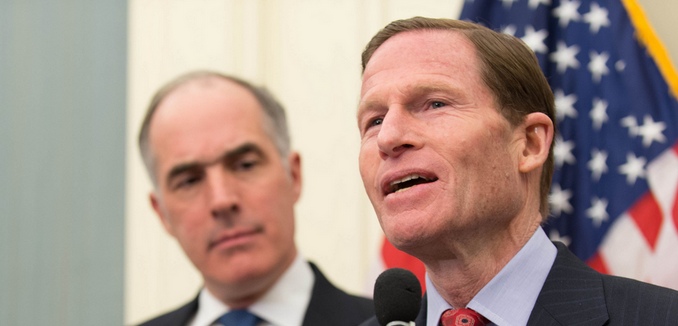The last-minute addition of a provision to the nuclear deal that will lift the arms embargo imposed by the United Nations Security Council on Iran has prompted a number of Democratic lawmakers to vocally express their concern, the National Journal reported yesterday.
Democrats are grappling with a reported phased lifting of a United Nations arms embargo, which the Iranians have demanded as the international community looks to lift sanctions worth some $150 billion. In exchange, Iran would reduce its centrifuges, convert a once-secret, underground mountain facility to one used only for peaceful purposes, and increase access for international inspectors to all of its nuclear facilities, among other points described in the White House’s framework struck in April.
“My concerns would be the same that anybody would have, which is a concern of a proliferation of weapons in that region by the Iranians,” said Sen. Michael Bennet of Colorado, adding that the embargo concerning conventional arms “is not what this negotiation is about.”
On Monday, Sen. Robert Casey of Pennsylvania said the issue was “of great concern” to him, Sen. Christopher Coons of Delaware reiterated his opposition, and Sen. Richard Blumenthal of Connecticut said it “probably” would be a line he couldn’t cross.
The article also quoted Sen. Robert Menendez (D – N.J.) who said, “Listen, the last thing we need to do is give Iran the ability to have the wherewithal to have arms going throughout the region. They’re already involved in Yemen, in Syria, in Lebanon, in Iraq. … What is lost here is that if we lift the arms embargo, then the Russians freely can sell the S-300 [missile] to them, and that makes it a lot more difficult in the future—should Iran violate the agreement and move towards their nuclear capability for a nuclear weapon—of trying to strike them with the S-300 as a defense missile system. For all of those reasons, it should be a redline. And the intercontinental missile issue should also be a redline.”
The concern expressed by the senators about ending the arms embargo was echoed even by members of the administration. The National Journal cited outgoing Chief of Staff Gen. Martin Dempsey and current Secretary of Defense Ashton Carter as opposing Iran’s ability to develop or acquire intercontinental ballistic missiles (ICBM). Carter was quoted as saying, “the I in ICBM stands for intercontinental, which means having the capability from flying from Iran to the United States … And we don’t want that.”
The nuclear deal announced this morning seeks to lift the UN arms embargo on Iran within five years and restrictions on missiles after eight years, a time-frame which could be further shortened if Iran does not violate the terms of the agreement, does not procure weapons illicitly, and proves to the International Atomic Energy Agency, the UN’s nuclear watchdog, that its nuclear program is of a peaceful nature. Andrew Bowen, a fellow at the senior fellow at the Center for the National Interest, warned yesterday that lifting the embargo “could endanger U.S. personnel at regional diplomatic and military facilities.”
[Photo: Senate Democrats / Flickr ]




